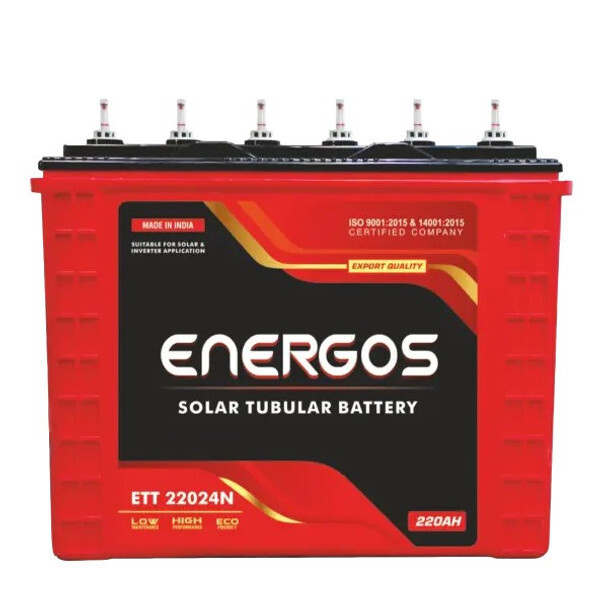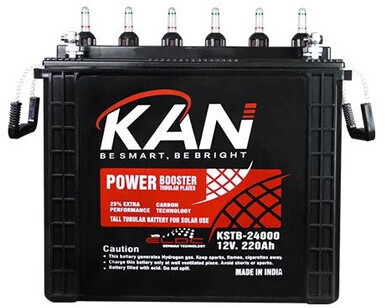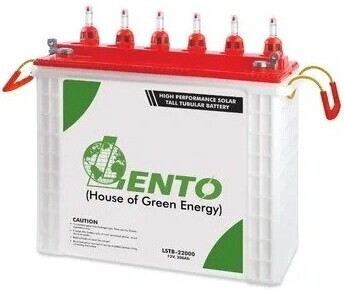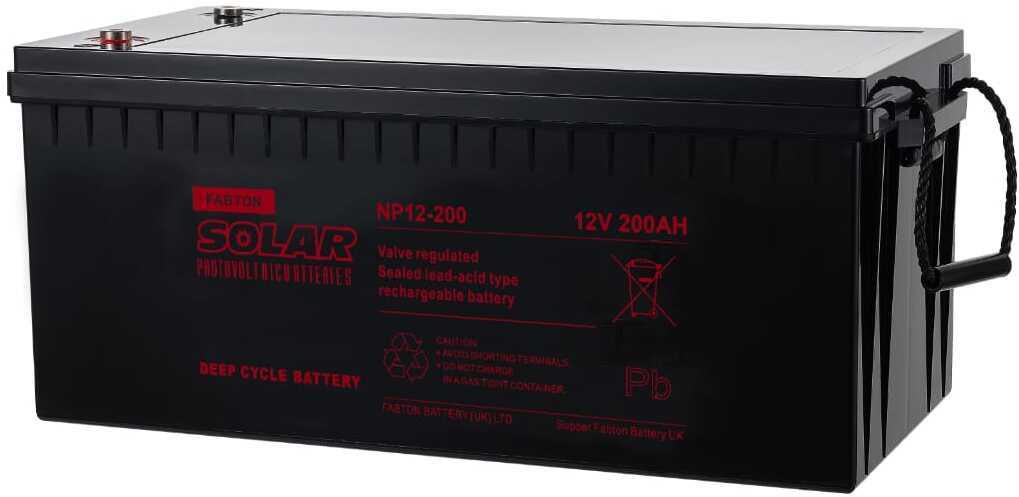Essential Maintenance Tips for Industrial Inverter Batteries
Introduction
Industrial inverter batteries play a crucial role in providing backup power to critical systems across various industries. Whether it's ensuring continuous operation during power outages, supporting renewable energy systems, or enabling reliable operation of essential machinery, these batteries are indispensable. However, just like any other equipment, they require regular maintenance to maximize their efficiency and lifespan.
Without proper care, inverter batteries can experience reduced performance, frequent breakdowns, or even premature failure, resulting in costly repairs or replacements. In this article, we will explore essential maintenance tips to ensure that your industrial inverter batteries remain in peak condition for years to come.
Read more...How to Maintain Your Inverter Battery for Longevity
Key Takeaway
- Regular Cleaning Prevents Performance Issues: Keep battery terminals clean and free from dust, corrosion, and leaks to ensure smooth operation.
- Check Water Levels in Lead-Acid Batteries: If using a lead-acid inverter battery, regularly top up with distilled water to prevent damage and extend lifespan.
- Avoid Deep Discharges: Discharging the battery below 50% capacity frequently can shorten its lifespan. Charge it promptly to maintain efficiency.
- Ensure Proper Ventilation: Industrial inverter batteries generate heat, so install them in a well-ventilated area to prevent overheating and prolong durability.
Energos 12V-220AH Tubular Battery
Understanding Industrial Inverter Batteries
Industrial inverter batteries are designed to store and supply energy for backup systems. These batteries come in various types, each offering unique benefits depending on the application.
Types of Industrial Inverter Batteries
-
Lead-Acid Batteries: These are the most common and economical battery type used in industrial inverter systems. They come in flooded, sealed, and gel variants, each with its specific maintenance needs.
-
Lithium-Ion Batteries: Known for their longer lifespan, higher efficiency, and reduced maintenance, lithium-ion batteries are increasingly popular in modern inverter systems.
-
AGM (Absorbent Glass Mat) Batteries: A type of sealed lead-acid battery, AGM batteries are maintenance-free and offer good performance in industrial settings.
-
Gel Batteries: These are a type of sealed lead-acid battery, known for being safer and requiring minimal maintenance. They are ideal for environments with fluctuating temperatures.
How They Differ from Regular Batteries
Industrial inverter batteries differ from regular consumer batteries in their size, capacity, and design. These batteries are built to handle high power loads and frequent charge cycles, making them suitable for heavy-duty applications. While regular batteries are typically small and low-capacity, industrial batteries are larger, can store more energy, and are designed for longer-lasting performance.
Why Regular Maintenance is Crucial
To ensure that your industrial inverter batteries continue to function optimally, regular maintenance is key. Neglecting maintenance can lead to a range of issues, including poor performance, higher energy costs, and even total battery failure.
Impact of Poor Maintenance on Efficiency and Longevity
Batteries that are not properly maintained can lose capacity over time, which means they will not store as much energy or discharge as efficiently. This reduction in performance can lead to increased energy consumption and higher operational costs. Additionally, a poorly maintained battery can degrade quickly, reducing its lifespan and increasing the need for expensive replacements.
Read more...How to Maintain Your Inverter Battery for Long-Term Welding Use
Consequences of Neglecting Maintenance
Failure to maintain batteries regularly can cause several problems:
-
Increased risk of unexpected failure or downtime.
-
Inconsistent power delivery to critical equipment.
-
Higher repair costs or the need for more frequent replacements.
Benefits of Proactive Maintenance
On the flip side, regular maintenance has significant advantages:
-
Extended Battery Life: Routine inspections and cleaning can help keep the battery in good shape, reducing the frequency of replacements.
-
Improved Efficiency: Well-maintained batteries will discharge and recharge more efficiently, saving on energy costs.
-
Increased Safety: Maintenance ensures that the battery is free from leaks, corrosion, or damage that could cause dangerous situations.
Kan 12v. 220AH Solar Tubular Battery
Essential Maintenance Tips for Industrial Inverter Batteries
Proper maintenance is essential for prolonging the life and performance of industrial inverter batteries. Here are some key maintenance tips to help you get the most out of your battery system.
Routine Visual Inspections
One of the simplest yet most effective maintenance tasks is performing regular visual inspections of the batteries. Look for any signs of wear or damage, such as:
-
Corroded Terminals: Corrosion on the terminals or connections can reduce efficiency and cause battery failure.
-
Loose Connections: Tighten any loose connections to prevent arcing and poor performance.
-
Leaking or Bulging Batteries: If you notice leaks, bulging, or any other visible signs of damage, the battery should be replaced immediately.
Additionally, ensure that the battery compartment is clean and free of debris, and that the area is well-ventilated to avoid overheating.
Battery Cleaning and Maintenance
Cleaning the battery terminals and connections is essential to prevent corrosion, which can affect battery performance. Follow these guidelines for proper cleaning:
-
Use a Solution: Clean terminals with a mixture of baking soda and water. This neutralizes the acid and removes corrosion.
-
Dry Thoroughly: Ensure that the terminals are completely dry before reconnecting them to avoid short-circuiting.
-
Inspect Cables: Check the cables for any signs of wear or fraying. Replace any damaged cables to maintain a solid connection.
When cleaning the battery casing, be sure to use a soft cloth or brush to avoid scratching the surface. Dust buildup can reduce battery performance, especially in lead-acid batteries, so it’s important to keep the battery clean.
Monitoring Battery Voltage and Charging Levels
Monitoring the voltage and charge levels is crucial to ensuring that your battery is operating within optimal parameters. This can be done using a voltmeter or battery management system (BMS). Key points to remember include:
-
Check Voltage Regularly: Ensure that the voltage is within the manufacturer’s recommended range. A voltage that is too high or too low can damage the battery.
-
Avoid Overcharging: Overcharging can cause the battery to overheat, shortening its lifespan. Make sure the charger is correctly set to avoid overcharging.
-
Prevent Deep Discharge: Deep discharging can lead to irreversible damage. Ensure that the battery does not discharge beyond the recommended levels.
By consistently monitoring these factors, you can ensure that the battery stays in optimal condition and functions as expected.
Lento Tubular Battery 220ah 12v
Checking and Maintaining Electrolyte Levels (for Lead-Acid Batteries)
Lead-acid batteries are widely used in industrial inverter systems, but they require specific maintenance to ensure they continue to operate efficiently. One of the key maintenance tasks is monitoring and maintaining electrolyte levels.
-
Why Electrolyte Levels Matter: The electrolyte in a lead-acid battery helps facilitate the chemical reaction needed to store and release energy. Low electrolyte levels can expose the internal plates to air, leading to permanent damage and reduced battery life.
How to Maintain Electrolyte Levels:
-
Check Regularly: Electrolyte levels should be checked at least every 3-6 months, depending on the battery usage and manufacturer’s recommendations.
-
Topping Up: If the electrolyte level is low, carefully add distilled water to the cells to bring it up to the recommended level. Never use tap water, as it may contain minerals that could damage the battery.
-
Ensure Proper Filling: When adding water, avoid overfilling the cells. Fill the cells just enough to cover the plates but not so much that it overflows when the battery is charging.
Testing Battery Capacity
To ensure that your industrial inverter battery is operating efficiently, periodic capacity tests are essential. These tests help assess whether the battery is holding the proper charge and discharging as expected.
-
How to Perform a Load Test: A load test applies a small load to the battery and measures its ability to maintain a certain voltage. This test can be done using a load tester or a battery management system.
-
Frequency of Tests: Battery capacity should be tested at least once a year or whenever performance issues are suspected.
-
Recognizing Deterioration: If the battery fails the load test or does not hold the charge for its usual duration, it may be a sign that the battery is deteriorating and needs replacement.
Environmental Considerations
The environment in which the battery is stored and operated has a significant impact on its performance and lifespan. To maximize the efficiency of your industrial inverter batteries, consider these environmental factors:
-
Temperature: Batteries perform best in moderate temperatures. Extreme temperatures, whether hot or cold, can cause the battery to degrade more quickly. Ensure that the battery is kept in a temperature-controlled environment, ideally between 20-25°C (68-77°F).
-
Excessive Heat: Overheating can lead to overcharging and reduced capacity. It’s important to avoid placing batteries near heat sources or in areas that are prone to high temperatures.
-
Freezing Cold: In very cold conditions, the electrolyte may freeze, leading to battery failure. Make sure the storage area is shielded from freezing temperatures.
-
Ventilation: Proper ventilation is necessary to prevent overheating. If your inverter battery is stored in a closed environment, ensure that the space is well-ventilated, as the battery may release gases during charging.
-
Moisture Control: Avoid exposing the battery to moisture or corrosive environments. Moisture can cause electrical short-circuits, rust, and internal damage to the battery. Store the battery in dry areas to avoid such issues.
Fabton 12V-220AH Deep Cycle Solar Battery
Battery Storage Best Practices
When industrial inverter batteries are not in use, proper storage is crucial to prevent damage and ensure they remain in good condition for future use.
-
Partial Charge: If you plan to store the battery for an extended period, keep it partially charged (about 50-70%) to prevent the battery from deep discharging.
-
Storage Location: Store the batteries in a cool, dry place with proper ventilation. Avoid placing them in areas with extreme temperatures or high humidity.
-
Periodic Checks: Even when stored, it’s important to check the battery every few months for any signs of deterioration or loss of charge. Recharge the battery if necessary.
Signs Your Industrial Inverter Battery Needs Replacement
Despite regular maintenance, there will come a time when the battery needs replacing. It’s important to recognize the signs that your battery has reached the end of its useful life:
-
Reduced Runtime: If the battery's runtime has significantly decreased, even after charging, it may no longer hold a sufficient charge and could need replacing.
-
Frequent Charging or Inconsistent Power Delivery: If the battery often requires recharging or fails to provide stable power, it may be a sign that it is losing its ability to store energy.
-
Physical Damage or Leaks: If the battery is visibly damaged, leaking, or has bulging sides, it’s time to replace it. Leaks can be hazardous and should be dealt with immediately.
-
Failure to Pass Capacity Tests: If the battery no longer meets the required voltage or fails the load tests, replacement is necessary to avoid further disruptions to your power supply.
Read more...Signs Your Inverter Battery Needs Distilled Water
Safety Precautions During Maintenance
Safety should always be a priority when maintaining industrial inverter batteries. Handling large batteries requires precautions to avoid accidents.
-
Wear Safety Gear: Always wear protective gloves and safety goggles to avoid skin and eye contact with battery acid or electrolyte solutions.
-
Follow Manufacturer Guidelines: Adhere to the manufacturer's maintenance recommendations to avoid voiding warranties and ensure safe handling.
-
Handle Leaks Safely: In case of a battery leak, clean it up immediately with the appropriate neutralizing agent, such as baking soda, and dispose of the battery properly.
Frequently Asked Questions
1. How often should I clean my inverter batteries?
It's recommended to clean your inverter batteries every 3-6 months or whenever you notice corrosion or dirt buildup on the terminals.
2. Can I maintain my inverter batteries myself, or do I need a professional?
While basic maintenance like cleaning terminals and checking voltage can be done by yourself, it’s important to consult professionals for complex tasks like battery testing or electrolyte management.
3. How can I extend the life of my industrial inverter battery further?
To extend the life of your battery, avoid overcharging, maintain the correct charge levels, store the battery in a controlled environment, and perform regular inspections.
4. What are the most common causes of battery failure?
The most common causes of battery failure are deep discharging, overcharging, improper storage, and lack of regular maintenance.
5. How can I dispose of old inverter batteries safely?
Old batteries should be disposed of at certified recycling centers. Never dispose of them in regular trash, as they can contain hazardous materials.
Related Articles
Tips To Maintain Your Inverter Battery
Navigating the World of Inverter Batteries: Expert Recommendations for Every Need
Why Use Distilled Water For Inverter Battery
Conclusion
Regular maintenance of your industrial inverter batteries is essential for ensuring their longevity and efficiency. By following these maintenance tips, you can prevent premature failure, reduce downtime, and save on costly repairs. Whether you’re performing routine inspections, maintaining electrolyte levels, or storing the battery properly, proactive care is key to optimal performance.
For the best results, invest time in maintaining your inverter batteries regularly to maximize their lifespan and efficiency.
Ready to optimize the performance of your industrial inverter batteries? GZ Industrial Supplies offers a wide range of high-quality industrial batteries and maintenance tools to keep your systems running smoothly. Visit our website at Gz Industrial supplies to browse our products and find the right solution for your business today!
Recent Posts
-
Why Use Distilled Water For Inverter Battery
Inverter batteries play a crucial role in ensuring the effective functioning of home and i …Apr 01, 2025 -
THE BEST MAGNETIC DRILLING MACHINE IN NIGERIA 2025 REVIEWS
Introduction The Magnetic drilling machines are power tools also called mag drills. They are es …Mar 31, 2025 -
Top Selling Magnetic Drilling Machines in Nigeria
Magnetic Drilling Machine is a portable drilling machine with a magnetic base (either electroma …Mar 31, 2025






